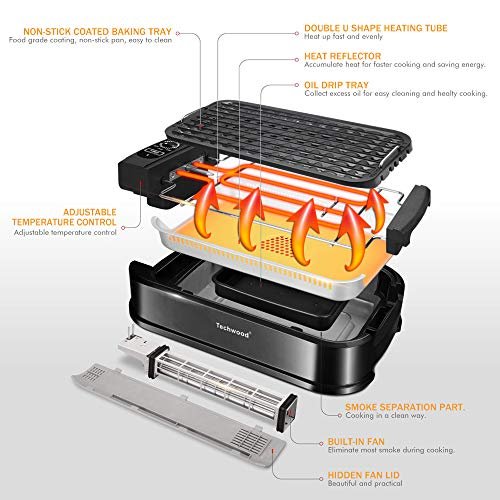Many people are looking for different ways to prepare healthy, appetizing food. Among the favorite ways to prepare meats and vegetables is grilling. There’s something about the smoky flavors and aromas of grilling that makes it a huge hit among people of all ages.
But with the changing seasons, this method of food preparation may not always be available. Luckily, modern technology has already solved this problem with electric or indoor grills. The best indoor grill allows you to cook your favorite vegetables and meats anytime at your convenience.
What Makes Indoor Grills Healthier?
While many people find the smoky flavor of charcoal-grilled foods more appetizing, an indoor grill also comes with healthier benefits.
Here are some reasons why an indoor grill is a healthier option than a charcoal grill.
- It’s an environment-friendly choice. Indoor grills work using electricity and let you avoid gas and charcoal, which release harmful gases to the atmosphere. This way, an electric or indoor grill is a healthier alternative to gas or charcoal grills.
Not only does it let you avoid frying food, but it also helps you support the environment by reducing your carbon footprint.
- It lets you avoid unhealthy fumes. Apart from being a threat to the environment, fumes from gas or charcoal grills can also be unhealthy for you. When using even a small 2 burner type of gas grill or charcoal grill in small spaces, the fumes can be dangerous.
Working with an electric grill, however, lets you enjoy your barbecue without these gases. An electric grill heats up its surface to cook your food, which is safe to use even inside a small kitchen.

- It lets you avoid HCAs and PAHs. HCAs or heterocyclic amines and PAHs or polycyclic aromatic hydrocarbons are considered cancer-causing.
PAHs are formed when fat from your meat drips into the hot coals and goes back into the food, because of rising smoke and flame-ups. HCAs are made when fish, red meat, and poultry are cooked over very high heat. Using an indoor grill reduces your exposure to these compounds with the help of temperature control options and the use of drip trays.
- It makes your cooking even. As an indoor grill heats its surface for cooking, it does so while evenly distributing heat over the area. Compared to a charcoal grill that may have hot spots, an indoor grill lets you evenly cook the meat or vegetables of your choice because of its temperature controls.
- It’s easy to clean. It’s important to keep cooking tools clean and this is true even with your grills. However, charcoal grills are usually messy, large, and heavy, making them difficult to maintain.

On the other hand, indoor grills are a breeze to clean. Most indoor grills come with a drip tray, which you can easily wash after each use. Its nonstick surface is easily cleaned with a damp towel while the grill is also dishwasher safe.
How to Maximize the Use of Indoor Grills
While grilling is much healthier than frying seafood, vegetables, or meats, there are other ways you can make the most out of your indoor grill.
Here are some tips to grill without the guilt.
- Try fruits and vegetables. Fruits and vegetables help provide the body with essential nutrients and enzymes that help you reduce the risk of getting hypertension, heart disease, or becoming obese. However, using oil to cook your vegetables can compromise the health benefits you get.
Grilling helps you cook vegetables and fruits without using oil, making it an appetizing and healthy preparation option. The best fruits and vegetables to grill include the following:
- Pear
- Tomatoes
- Apples
- Zucchini
- Red and green bell peppers
- Eggplants
- Pineapples
- Choose lean meats. By putting lean cuts of pork, beef, or skinless chicken for grilling, you’re making a healthier choice. Even if grilling removes some of the fat from your food, eating healthy starts with you choosing leaner meats for grilling.
- Marinate your food before grilling. The best way to infuse your desired flavor into seafood, meats, fruits, and vegetables is to marinade them. Many people use vinegar, wines, lime or lemon juice, pineapple juice, honey, herbs, onions, garlic and spices in their marinade. To limit the amount of fat you get in your food, choose low-fat or fat-free marinades.

Here are some additional tips to remember:
- If you’re making your own marinade or buying ready-to-use ones, choose recipes or products that contain canola or olive oil.
- If you marinate the food for longer than 30 minutes, put it inside the refrigerator.
- Don’t use the marinade you soaked your meat in to avoid passing raw meat juices to your cooked meat. Instead, before adding meat into your marinade, set aside some marinade for basting your meat later.
- Marinate fish and vegetables for an hour while poultry and meat should be marinated for at least an hour or two.
- Reduce grilling time. A great way to do this is to slice smaller portions of fish, poultry, and meat. This way, food is quickly cooked. Another way is to half-cook the fish, meat, and poultry in the microwave or oven and finish it off on the grill.
- Put skewers into good use. Another way to trim down grilling time is to put food into skewers for grilling. Shrimp, scallops, zucchini slices, chicken, or mushrooms all cook great in skewers.
Final Thoughts
Aside from the convenience that an indoor grill provides, it also presents a healthier way to prepare food.
In choosing an indoor grill, it’s important to check if it comes with a drip tray. This way, your exposure to cancer-causing compounds will be minimized. If you’re health-conscious, an indoor grill might be a helpful option in maintaining your lifestyle.


























